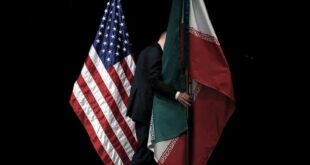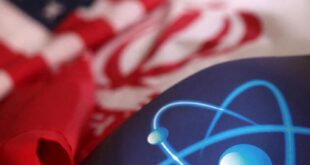TEHRAN (AP) — Iran’s nuclear capability has increased “tenfold” despite Western pressure to roll back the country’s nuclear programme, the country’s firebrand president said Monday.
As the United Nations Security Council prepares to consider a draft resolution imposing sanctions on Iran because of its refusal to halt uranium enrichment, diplomats in Vienna, where the UN nuclear watchdog is based, confirmed Monday that Iran had recently expanded its nuclear activities. Although the developments to the atomic energy programme that the diplomats spoke of are not on the magnitude that President Mahmoud Ahmadinejad boasted, they highlight Tehran’s continuing defiance of the council.
Iran’s top nuclear negotiator underlined that stance Monday saying that punitive measures imposed by the international community would only increase Iran’s determination to continue its programme.
President Ahmadinejad told a crowd on the southern outskirts of Tehran: “The enemies, resorting to propaganda, want to block us from achieving [nuclear technology].” He added: “But they should know that today, the capability of our nation has multiplied tenfold over the same period last year.” Ahmadinejad claimed that “the power of our enemies is less than one-tenth of their power in last year.” The president did not elaborate, and the remarks appeared aimed primarily at rallying public support ahead of council meetings on the draft resolution.
In the speech, Ahmadinejad repeated that Iran was ready to negotiate with the West about its nuclear ambitions. But the West has insisted that Tehran first suspend enrichment.
In recent weeks Iranian nuclear experts had started up a second pilot enrichment facility, diplomats in Vienna told the Associated Press Monday on condition of anonymity because they were not authorised to divulge the information to media.
There was no official confirmation from the International Atomic Energy Agency (IAEA), which has taken the lead in probing Tehran’s nuclear programme since the existence of a clandestine enrichment programme was revealed more than three years ago, with after hours calls unanswered.
Ali Ashgar Soltanieh, the chief Iranian envoy to the IAEA, said he had no knowledge of “new developments” at Natanz.
But he told the AP that all nuclear activities “are going on as planned”. The 164 centrifuges were not producing enriched uranium, but only undergoing a “dry test”. Enriching uranium is a key step to producing fuel either for a nuclear reactor or for a warhead.
Iran insists its nuclear programme is for peaceful purposes.
The United States and some other countries have accused the Iranians of secretly seeking to build a bomb.
The Iranians disregarded an August 31 deadline imposed by the Security Council to stop enrichment, which it began in February using its initial cascade of 164 centrifuges at its pilot plant at Natanz, producing a small batch of low-enriched uranium — suitable as nuclear fuel but not weapons grade. They also turned down a package of incentives offered by the United States and its partners on condition that Iran ceases enrichment.
Iran said it plans to install 3,000 centrifuges at its enrichment plant in Natanz, central Iran, by the last quarter of 2006. Industrial production of enriched uranium in Natanz would require 54,000 centrifuges.
Meanwhile, Iran’s top nuclear negotiator Ali Larijani warned against imposing sanctions on his country.
“If Westerners take harsh approaches, their practice will not be much effective, rather this will make the Islamic Republic of Iran more determined to continue with its nuclear activities,” Iran’s official news agency reported Larijani as saying.
Western diplomats say they expect to circulate a draft resolution at the United Nations in the coming days that would impose limited sanctions. It remains unclear whether Russia and China — both veto-wielding permanent council members — would go along with punitive measures.
In Moscow, Russian Foreign Minister Sergei Lavrov said Monday he was hopeful talks with the Iranians would resume and that there was a “real chance” for a negotiated settlement without sanctions.
However, the EU external relations commissioner, Benita Ferrero-Waldner, said that Tehran had not responded positively to the incentives package and that the Security Council may need to explore “another alternative.”
 Eurasia Press & News
Eurasia Press & News

